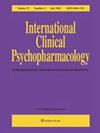微粉化/超微粉化棕榈酰乙醇酰胺可改善2019年冠状病毒病(COVID-19)幸存者的抑郁和疲劳。
IF 2.1
3区 医学
Q3 PHARMACOLOGY & PHARMACY
引用次数: 0
摘要
2019年冠状病毒病(COVID-19)可能会导致神经精神后遗症。棕榈酰乙醇酰胺(Palmitoylethanolamide,PEA)是一种抗炎和神经保护酰胺,可用于治疗抑郁症。在此,我们研究了微粉化/超微粉化(m/um)PEA是否能改善COVID-19幸存者的神经精神后遗症。2021 年 2 月至 8 月期间,在我们的 COVID-19 后门诊接受评估并出现神经精神症状的患者(n = 98)接受了 m/umPEA 600 毫克的治疗,每天两次,持续 3 个月。接受 m/umPEA 治疗的患者(n = 57)与不接受治疗的患者(n = 41)在抑郁、疲劳、慢性疼痛和主观幸福感方面进行了比较,并在治疗前和治疗后进行了有效的量表测量。两组患者在人口统计学、合并症、精神病史、抗抑郁治疗、急性 COVID-19 严重程度和基线神经精神状态方面没有差异。接受 m/umPEA 治疗的患者在抑郁和疲劳方面的改善程度更大(P 均为 0.05)。相反,慢性疼痛或主观幸福感的变化与此没有关联。在多变量逻辑回归中,m/umPEA 预测神经精神状况的改善与年龄、性别和基线神经精神状况无关。治疗前疲劳和主观幸福感较差的患者最有可能从治疗中受益。总之,尽管研究具有回顾性,但我们的研究表明,m/umPEA 可改善 COVID-19 幸存者的抑郁和疲劳状况,这为今后在此领域的研究提供了依据。本文章由计算机程序翻译,如有差异,请以英文原文为准。
Micronized/ultramicronized palmitoylethanolamide improves depression and fatigue in coronavirus disease 2019 (COVID-19) survivors.
Coronavirus disease 2019 (COVID-19) may lead to neuropsychiatric sequelae. Palmitoylethanolamide (PEA) is an anti-inflammatory and neuroprotective amide used in depressive syndromes. Here we investigate whether micronized/ultramicronized (m/um) PEA improves neuropsychiatric sequelae in COVID-19 survivors. Patients evaluated at our post-COVID-19 outpatient clinic between February and August 2021 and presenting neuropsychiatric manifestations (n = 98) were offered treatment with m/umPEA 600 mg twice daily for 3 months. Those accepting m/umPEA therapy (n = 57) were compared with those who did not (n = 41), in terms of depression, fatigue, chronic pain and subjective well-being, through validated scales administered pre- and posttreatment. The two groups did not differ in terms of demographics, comorbidities, psychiatric history, antidepressant therapy, acute COVID-19 severity and baseline neuropsychiatric status. Patients receiving m/umPEA showed a greater improvement in depression and fatigue (both P < 0.05). Conversely, no association was found with changes in chronic pain or subjective well-being. At multivariable logistic regression, m/umPEA predicted neuropsychiatric improvement independently of age, sex and baseline neuropsychiatric status. Worse pretreatment fatigue and subjective well-being identified those who most likely benefited from treatment. In conclusion, despite its retrospective nature, our study suggests that m/umPEA may improve depression and fatigue in COVID-19 survivors, justifying future research in this setting.
求助全文
通过发布文献求助,成功后即可免费获取论文全文。
去求助
来源期刊
CiteScore
4.40
自引率
23.10%
发文量
97
审稿时长
>12 weeks
期刊介绍:
International Clinical Psychopharmacology provides an essential link between research and clinical practice throughout psychopharmacology. It reports on studies in human subjects, both healthy volunteers and patients, which relate the effects of drugs on psychological processes.
A major objective of the journal is to publish fully refereed papers which throw light on the ways in which the study of psychotropic drugs can increase our understanding of psychopharmacology. To this end the journal publishes results of early Phase I and II studies, as well as those of controlled clinical trials of psychotropic drugs in Phase II and IV. Other topics covered include the epidemiology of psychotropic drug prescribing and drug taking, the sociology of psychotropic drugs including compliance, and research into the safety and adverse effects of these compounds.

 求助内容:
求助内容: 应助结果提醒方式:
应助结果提醒方式:


